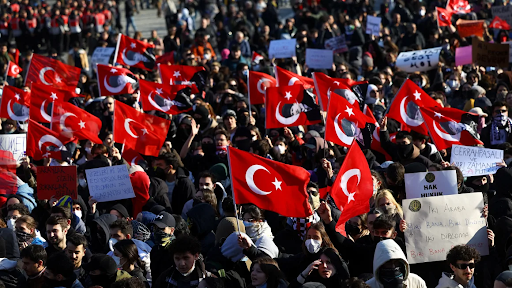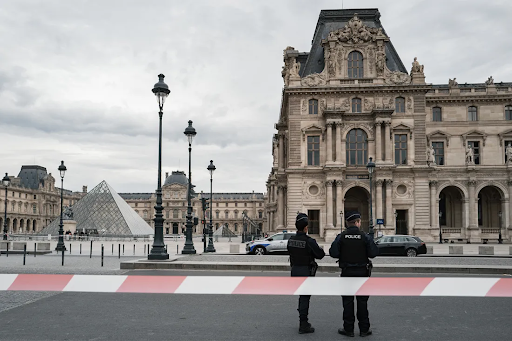Over 1,000 people have been detained as protests in Turkey continue over the jailing of Istanbul mayor Ekrem Imamoglu. The BBC reports that Imamoglu was jailed on corruption charges, as well being charged with “establishing and managing a criminal organization, taking bribes, extortion, unlawfully recording personal data and rigging a tender,” while also being suspended from his mayoral post. Imamoglu was also accused by prosecutors for “aiding an armed terrorist organization,” but was not included in the charges against him. Before his arrest, Istanbul University said that Imamoglu’s degree would be revoked, which would put his candidacy into question, due to the Turkish constitution requiring that presidents to have completed higher education.
Imamoglu had been rising as a political competitor to current Turkish president Recep Tayyip Erdogan. Erdogan called the protests “evil” and blamed the Republican People’s Party (CHP) for “disturbing the peace of our citizens with provocations.” Imamoglu stated that the allegations he has been accused of were politically motivated, which Erdogan denied. While speaking from Ankara, the capital of Turkey, Erdogan had called for the protests to end.
According to CNN, on Mar. 24, 2025, Turkish Interior Minister Ali Yerlikaya posted on social media site X that “1,133 suspects were detained in illegal activities carried out between March 19 and March 23,” also adding that “among those captured were individuals affiliated with 12 different terrorist organizations.” Imamoglu was formally arrested days before he was expected to be named as a candidate for CHP for Turkey’s next presidential election, expected to happen in 2028. About 100 others with connections to Imamoglu, including Istanbul district mayors Resul Emrah Sahan and Murat Calik, were also detained. Since the arrest, Imamoglu has denied the charges against him and said the arrest represents a turning point that is dangerous for Turkey as Erdogan works on continuing to further extend his rule.
Protesters are not the only people being targeted by the arrests, as journalists have been detained as well. AP News reports that several journalists were arrested at their homes by Turkish authorities. The Disk-Basin-Is media workers union said that at least eight reporters and photojournalists had been detained. They called it an “attack on press freedoms and the people’s right to learn the truth.” The union also called for them to be released immediately.
According to Reuters, Erdogan has been in power in Turkish politics for over 20 years, but has reached his term limit. If he wants to run for office again, the parliament will need to call for the elections early, or they will need to revise the constitution. Television channels have also been punished for their coverage of Imamoglu’s arrest. The Radio and Television Supreme Council (RTUK) said that four opposition channels were penalized, one of them, which was SZC TV, was ordered to stop broadcasting for 10 days. The other three channels, which were Halk TV, Tele1, and Now TV were fined and ordered to halt some TV programs. Financial assets in Turkey have also gone down, which has prompted the central bank to start using reserves in order to support the Turkish lira.
Since the protests began, protesters have clashed with the police in the street, with police using force and other tactics against the protesters. AP News reports that on Mar. 27, 2025, protesters encountered police in the streets of Ankara, with police deploying pepper spray, plastic pellets, and water cannons against the protesters.
While the protests in Turkey continue, the decision of Imamoglu’s arrest, and potentially Turkey’s future, remains in question.








